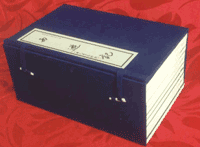 |
| Comic book of
A Dream of the Red Mansion |
Lin Daiyu
is perhaps the most studied Chinese literary woman figure in history.
To tell the story of her, one must first take a look at the literary work
that gives life to her. It is the famous Chinese classic A Dream of
the Red Mansions, first written in 1754 and titled Shitou Ji (Record
of the Stone). The author Cao Xueqin, (1735 or 36 - 1763 or 64) finished
only the first eighty chapters of the book due to poverty, poor health
and family tragedy. In 1791, a government official named Gao E added the
last forty chapters. Though literarily inferior than Cao Xueqin’s
original chapters, they have since been accepted by the reader because
of their successful treatment of the tragic end of the protagonists’
love affair. A Dream of the Red Mansions as we know it today
consists of all the 120 chapters, with a total of 1,075,000 Chinese characters.
A Dream
of the Red Mansions has had a tremendous influence on the Chinese
literary history. There have been nearly fifty attempts to add more stories
to it. The study of the work has become as serious and fruitful as that
of Shakespeare or Goethe. Since the first English translation in 1842,
it has been translated into twenty languages. It may not be an exaggeration
to say that to understand China, one must read A Dream of the Red
Mansions.
The book,
with over 400 named characters from all walks of life, has two main threads,
namely, the tragic love affair of the young and rebellious Baoyu and Daiyu
and the rise and fall of the traditional and decadent families of Jia,
Shi, Wang and Xue.
Born an
innocent beauty, Lin Daiyu loved and hated without a qualm. She yearned
for spiritual rather than material gratification. Jia Baoyu, as a lineal
decent of the Jia family, was its heir apparent. However, the handsome
and smart young man was nowhere near what the family would like him to
be, rebelling against traditions, opposing inequalitybetween masters and
servants, and disdaining the conventional ethics of treating women as
inferior to men. When the two came together, they found a lot in common
and plenty of love for each other.
Deeply
involved in Lin Baoyu and Jia Daiyu’s tragic love was Xue Baochai,
who served as a contrast to Lin Daiyu. A daughter of an eminent family,
Baochai had a more realistic goal, that was to attain as many riches and
honors as she could. While the beautiful but extremely delicate Lin Daiyu
was willful, aloof and oversensitive and therefore was shunned by other
people around her, the equally pretty Xue Baochai, who was sensible, tolerant
and gentle, became everyone’s favorite. Lin Daiyu was affectionate,
naïve, frank and simple, but Xue Baochai was shrewd, dispassionate,
and capable of ill intentions. Lin Daiyu embodies individual pursuit of
freedom, whereas Xue Baochai symbolizes conformity and social order. It
was no wonder that the Jia family would want Baochai as Baoyu’s
spouse instead of Daiyu, bringing the innocent love between Baoyu and
Daiyu into a tragic end.
The relationship
between Lin Daiyu and Jia Baoyu is by no means one of lust. Nor is their
love platonic. It is, according to some scholars of A Dream of Red
Mansions, a bond in the dreamland and of predestination. Everyday
in the garden of the Red Mansions, they “read, write, paint, chant,
riddle, embroider, enjoy plants and flowers, and play musical instruments,
chess, and word puzzles.” By contrast, in the real world, other
male members of their family such as Jia He, Jia Zhen, Jia Lian and Jia
Rong were indulging themselves in unchecked prurient activities.
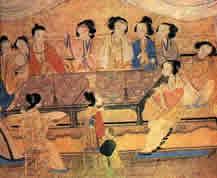 |
| An illustration
in an older version of A A Dream of the Red Mansions |
In fact,
the author of A Dream of the Red Mansions used this contrast
as an allegory, an extended metaphor of a well-known legend, namely, the
story of Nu Wa Mending the Sky. The legend
goes that Nu Wa was the creator of humans. When the sky was torn and the
world inundated, she tempered colored stones to mend it. The book of
A Dream of the Red Mansions begins with a piece of stone left behind
by Nu Wa. Eventually it was reborn into the Jia family and became Jia
Baoyu. Lin Daiyu, said to be the incarnation of a divine herb, was also
dubbed by the author "the goddess of Xiao and Xiang," wives
of Fu Xi who was said to be the husband of Nu Wa. Therefore, a scholar
of A Dream of the Red Mansions argues that the author treated
Jia Baoyu as the masculine side of the Goddess Nu Wa while Lin Daiyu,
the feminine side. Their arrival in the Red Mansions as an alliance of
stone and wood was to continue Nu Wa’s mission of ridding the world
of flood. In their case, it was the flood of licentiousness. Jia Baoyu
and Lin Daiyu were two aspects of the same wholeness. When separated,
they would certainly be doomed. Indeed, one can infer that by presenting
the destruction of two innocent young lives along with their beautiful
dreams, the author made a cruel condemnation against the stifling and
debauched feudal society of his time.
The plot
of A Dream of the Red Mansions is innovative and ingenious. Beginning
with a romantic legend of Nu Wa, it leads to the realistic story of the
Red Manions through intricate mists of dreams and illusions – a
technique of telling the truth through pretended falsehood. This contributes
to the difficulty in understanding the inner world of the characters,
Lin Daiyu in particular. There may be as many interpretations of her life
and her relations with the people in the Red Mansions as the people who
read her.
Lin Daiyu, said to be the incarnation of a divine herb, was the only daughter
of Lin Ruhai, a scholar official and Jia Min, a member of the Jia family
in the Red Mansions of Rong. When Lin Daiyu was six, her mother died and
as she grew up into a teen, her father left her to the care of her maternal
Grandmother Jia, the matriarch of the Red Mansions before his own death.
In the
Red Mansions, there lived four related large and eminent families, namely
the Jia, the Shi, the Wang and the Xue. The Jia family had a son named
Baoyu, or Precious Stone. Indeed, he was originally a piece of stone left
by the Chinese creator Goddess Nu Wa, who had saved the inundated world
by mending the punctured skywith stones she had tempered. To his mortal
parents’ amazement, Jia Baoyu was born with a precious stone in
his mouth. It later was carved into a talisman as part of his necklace.
It was regarded as indispensible with his life. On the anniversary of
his birth, he was made to go through a future-telling ritual of picking
one of a collection of symbolic items randomly displayed before him. Ignoring
an official seal, gold and classic books, he picked up a piece of cosmetic
used by women, much to his parents dismay. They had hoped that he chose
the other items so that he could be an official, a man of wealth, or at
least a scholar when he grew up. Now they feared that he would become
a man of debauchery. He might not be dissipated, but as he grew up, he
began to disdain the imperial examination system and oppose the tradition
of treating women as inferior to men. In his eyes, women were made of
pure water while men, contaminated dirt. He often said, “Whenever
I saw girls, I feel refreshed, but the sight of men really stinks!”
Lin Daiyu
was aloof, proud, naïve and straightforward. Despite her dependency
on her grandmother for her living, having nothing to call her own but
herself, she refused to conform blindly to the accepted customs and yield
to the Confucian ethics. Whenever and wherever she could, she would defend
her character and integrity. Her personality was such a match with that
of Jia Baoyu that the latter welcomed her without the slightest reservation
upon her arrival in the Red Mansions. Instead, he found her a congenial
partner, claiming that he had seen her sometime somewhere.
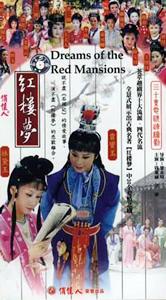 |
| Lin
Daiyu reading a romance play script Xixiang Ji (Notes of
the West-Wing Chamber) |
In the
Xue family, there was a girl named Baochai. She was beautiful and graceful,
scrupulously abiding by the conventional rules that women were made to
obey. Shrewd, diplomatic and manipulative, she knew how to make friends
and consequently became the favorite girl of all the families. She had
a necklace of gold lock. Her mother had very early spread the word that
she would match her daughter with one with a necklace of precious stone.
Everyone knew whom she was referring to.
One of
Jia Baoyu’s cousin was the emperor’s favorite concubine. During
her home visit, she talked the patriarchs and matriarchs of the Red Mansions
into allowing Baoyu and the girls to live in the Daguanyuan Garden, away
from their parents' close scrutiny. There they found freedom. Jia Zheng,
Baoyu’s father, wanted him to spend his time and energy studying
the classics so that he could pass the imperial examination and glorify
his family. Jia Baoyu overly agreed but covertly opposed the idea. Instead,
he was beyond himself with joy when he managed to procure a banned book
titled Xixiang Ji (Notes of the West-Wing Chamber), a story of
a young man and young woman falling in love and kept a secret tryst with
the help of a sympathetic and wise maid Hong
Niang. Immediately he invited Lin Daiyu to a garden near the Qinfang
Bridge, where he shared the book with her. They read and compared notes.
At a point, Jia Baoyu was carried away and, referring to the protagonists
of the book, bolted out, “I am the melancholy and sickly young man
and you are the gorgeous and pretty young woman.” At the remark,
Daiyu blushed with shyness and anger, feeling her integrity as an innocent
girl was violated. Pointing at Baoyu, she blasted him for his nonsense
and threatened to tell his parents about it. She let him off the hook
only after he apologized profusely. For that was the last thing she would
do.
Sensitive
as she was, Lin Daiyu had already detected the Red Mansion’ favoritism
for Xue Baochai. What was worse, she also discerned Xue Baochai’s
interest in Jia Baoyu. She had been disturbed by the theory of a gold
necklace matching a jade one all along. Her jealousy of Xue Baochai grew
so intense that she became capricious, often getting mad with Baoyu without
apparent reasons. One instance, however, changed her attitude temporarily.
She overheard Baoyu complaining with distaste about Baochai’s insistence
on his pursuing for officialdom, which he resented very deeply.
Lin Daiyu
and Jia Baoyu’s carefree days were soon over. One day, Baoyu was
suddenly summoned to his father’s study, where Jia Zheng questioned
him and given him a severe beating for offenses that simply made the patriarch
lose his mind. It was a long story. Jia Baoyu’s mother had caught
sight of a maid flirting with Baoyu and drove her out of the Red Mansions.
Ashamed, she committed suicide. Jia Zheng was questioning him about the
incident when Lord Zhongshun, an infrequent guest, rushed in. It turned
out that His Highness had a gay partner named Qiguan, an opera actor acting
as a woman. Since the actor had fallen in love with a woman, he suddenly
disappeared from Lord Zhongshun’s mansion. His Highness soon learned
that it was Jia Baoyu who offered the actor a refuge in a house he had
bought him. He was here to claim the actor.
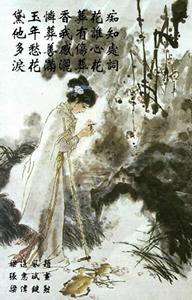 |
| Lin
Daiyu burying flowers |
A pedantic,
old-fashioned Confucius scholar, Jia Zheng flew into a rage because his
son’s behavior was considered deviant from every fiber of the Confucius
doctrines. To add oil to the flame, Jia Huan, Baoyu’s half-brother,
who had a grudge with the fact that his mother was his father’s
concubine, wanted to get back with Baoyu. He came in to tell Jia Zheng
about the death of the maid on the heel of Lord Zhongshun's departure.
Instead of telling the true, he put the blame on Baoyu, accusing him of
raping the maid.
The injuries
from the beating were so severe that Baoyu could neither lie down nor
get up. He could only stay in bed on all fours with the skin on his buttocks
torn and flesh gaping open. Xue Baochai came with medicine. Baoyu also
came with tears. In his dream, Baoyu murmured, “Damn the gold and
jade connection. I want jade to match wood,” by which he meant Lin
Daiyu, the incarnation of a divine herb.
At the
suggestion of Xiren, the personal maid of Baoyu’s mother, Baoyu
was separated from the girls and placed in the care of the maid herself.
They were living in the Yihong Garden while Lin Daiyu was relocated to
the Xiaoxiang Garden. They kept in touch only with the help of Daiyu’s
maid Qingwen, who volunteered to be their messenger. Gradually, Daiyu
had a collection of love letters, some written on handkerchiefs and fans.
One evening,
Lin Daiyu came to visit Jia Baoyu, but was mistaken by a new maid and
turned away. She was about to turn and leave when she caught site of Jia
Baoyu seeing Xue Baochai out of his bedroom. Xue Baochai had also come
to visit him. Lin Daiyu was stunned. She felt a sense of betrayal.
Without
the love of Baoyu, she felt all the more lonely in the Red Mansions. The
falling petals of the flowers out of her windows in the late spring touched
the chord of her wounded heart. With a basket and a pick, she went into
the garden. Comparing the fallen petals to herself, she began to bury
them, and asked herself, “Flower petals falling all over, who pities
a girl whose life is dwindling?” “Peaches and pears can bloom
again, God knows who will reside in my chamber next spring?” The
more she thought, the lonelier she became. She felt a shudder at the thought
of the indifference she had suffered. It was as if she were injured by
“the knife of wind and sword of frost,” every single day of
the year. Weeping and sighing, she chanted:
“I
wish I could fly to the end of the word
With the petals, but can I find my grave yonder?
In a pouch I collect thou delecate bones,
Beneath a cup of sanitary earth I bury thee.
Clean I was born as clean as I am gone,
It is better than if I were stuck in sewage.
I bury thee when thou dust become,
Who will bury me when I leave the world?
One may think I am crazy burying flowers,
Who will be the caretaker of the deceased me?
When flowers wither and spring comes to a close,
It is time for a girl to see the last of her days.
Once the spring ends and the girl dies,
Flowers and girl would be unknown to one another.”
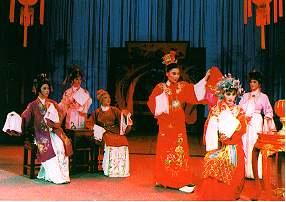 |
| Jia Baoyu discovered
the swith: the bride was Baochai instead of his Baoyu. |
In the
meantime, Lin Daiyu’s grandmother, Xue Baochai and other girls were
in the garden enjoying themselves. Among them was Jia Baoyu. When he saw
Lin Daiyu, he told her what had happened in his residence. Realizing the
mistake, Daiyu reconciled with him. The two were engaged in a tender and
lingering conversation.
The discovery
of the love affair between Lin Daiyu and Jia Baoyu appalled Lin Daiyu’s
parents and the matriarch Grandma Jia. They wanted him to marry Xue Baochai
as soon as possible. Fearful of Baoyu’s backlash, they disguised
Xue Baochai as Lin Daiyu. Incidentally, in the traditional wedding ceremony,
a bride's face is covered during the entire process until the bride and
her groom retire to their own chamber, when the groom will lift the cover
off her head and finish the matrimonial ritual.
An accidental
leak of the preparation for Jia Baoyu’s marriage with Xue Baochai
by a maid struck Lin Daiyu ill. She was so ill that she was going to die.
She asked Qingwen, her maid, to burn all the love letters that Baoyu had
written to her, deeming them useless as their author had betrayed her.
Ironically,
while Lin Daiyu was on her deathbed, Jia Baoyu was joyously thinking that
he was taking her to his chamber to. In fact he was made to marry Xue
Baochai. When he realized who she was, Baoyu rushed to Xiaoxiang Garden
to see what happened to Lin Daiyu. The news of her death knocked him out
of consciousness.
Xue Baochai
carefully nursed him back to life, hoping that he would change his heart
and mind. But how could he. Day and night he was thinking of Lin Daiyu.
As soon as he received a reminder from his father that he ought to leave
for the capital to take the imperial examination, he said good-bye to
Xue Baochai and the rest of the family and took off, never to return.
He was nowhere to be found!
Years after,
someone claimed that he had seen Jia Baoyu, dressed up like a monk, wandering
aimlessly in the snow.
Story
retold/ translated by Haiwang Yuan, ©2003
Last updated: October 23, 2003 |